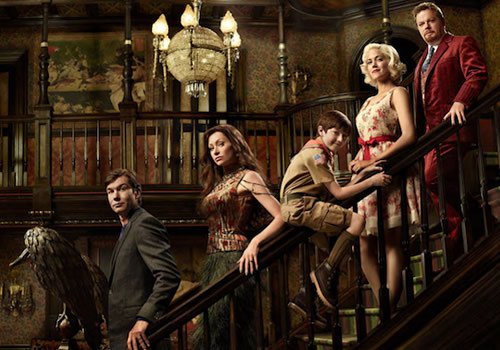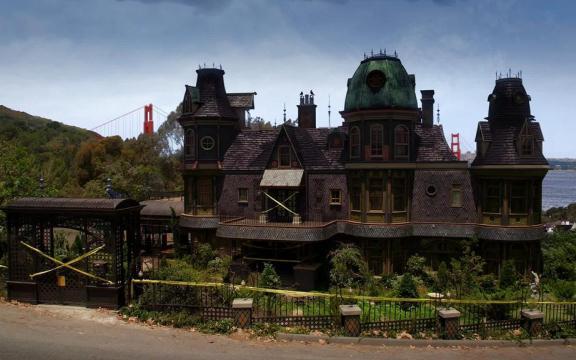Review: Mockingbird Lane
Rising from the television graveyard like a bloodthirsty ghoul, NBC's Mockingbird Lane is a loving homage to that unforgettably irreverent '60s sitcom The Munsters. Instead of attempting to ape the classic show, writer Bryan Fuller and director/producer Bryan Singer have produced a high-concept family drama that twists the characters from the original series and breathes (or should I say, zaps?) new life into them.

Like many, I was skeptical when I first heard that NBC was going to reboot The Munsters for a new generation. Not because I hold the original ABC comedy in any high regard—I was always more of an Addams Family guy, myself—but because the whole premise seems too ridiculous and outlandish for reality-obsessed television viewers in 2012. How could a fictitious family of freaks and monsters possibly compete with the Kardashians or Honey Boo Boo? By combining the quirkiness of Pushing Daisies and the dark humor of Dead Like Me with lavish sets, upscale production values, and impressive-for-television special effects, Mockingbird Lane presents a believable world for these Munsters to inhabit.

Because young Eddie Munster has unknowingly reached the tender age when a boy becomes a werewolf and attacked his Boy Scout troop during a camp-out, the Munsters quickly pack up and flee their former residence. This leads to the origin story of the family's iconic house, as a real estate agent tries to talk Marilyn out of buying the ominous-looking mansion at 1313 Mockingbird Lane, informing her that it was the home of a notorious serial killer who poisoned countless hobos. Non-plussed about the possibility of hobo corpses in the walls, Marilyn sees this as a selling point and notes that her family prefers the grounds "pre-cleansed."
In comparison with the original series, all of the characters have undergone some level of change, both in terms of appearance and personality. Rather than an oafish slapstick take on Boris Karloff's Frankenstein Monster, Jerry O'Connell's Herman is a devoted family man whose only fault is that he loves too hard, which is dangerous because his heart is allegedly his only remaining original body part and it is losing steam. While most of Lily's changes are superficial, Marilyn looks almost identical to her '60s counterpart, but she is not quite as naive.
The biggest difference in characters is Grandpa Munster, the ancient undead vampire famously played for laughs by Al Lewis. Since that character was so closely identified with Lewis for years, Eddie Izzard's take on the role is far more sinister and dangerous. At times benign, this Grandpa has more devious schemes in mind, although he also uses his powers for more mundane tasks. Shortly after moving in, Grandpa laments that he "preferred it when the village was further away and we had a moat," to which Marilyn cheerfully responds, "The best moats are made of good manners and filled with congeniality." Inspired by her words, Grandpa bakes his new neighbor a delicious plate of cookies that contain drops of his blood, putting the man under his spell. This prompts a deadpan admonition from Herman when he sees the neighbor painting the house on Grandpa's orders: "Don't turn the neighbors into your blood slaves."
Just like the characters within, Mockingbird Lane is a stark outcast in the land of network television. Although it could be described as a family version of HBO's True Blood in some ways, there is nothing quite like it on TV. Featuring more heart and less camp and cheese than the original Munsters, Mockingbird Lane uses the family's bizarre issues to relate to the average viewer and identify with their struggles. So why did NBC neglect to pick up such a unique and visually striking series? After spending a reported $10 million on this pilot episode alone, the network undoubtedly questioned if mainstream audiences would be able to tolerate gruesome weirdness, such as Herman's heart condition and discussions about mothers wanting to eat their "fragile and/or edible" babies, on a weekly basis. Hopefully, the reaction to this purported Halloween special will be positive enough for NBC to consider taking it to series after all. Mockingbird Lane is definitely worth the hearse ride.
FINAL GRADE: A-
- Bryan Fuller
- Bryan Singer
- Jerry O'Connell
- Portia de Rossi
- Eddie Izzard
- Charity Wakefield
- Mason Cook
Show:
- Mockingbird Lane
Network:
- NBC
Oct 27th, 2012, 12:01 pm
I agree with all below. I liked this a LOT more than I was expecting. Since I was skeptical about a reboot of a classic show, I hadn't looked much into it. Every time I saw the name, I just thought, "Uh, bad idea." But, it was MUCH better than expected and didn't know the connection but afterward realized that it did have a "Pushing Daisies" tinge about it.
The cast alone makes it worthy of a season. Fingers crossed.
Next Article
Lena Dunham's Obama ad draws conservative outragePrevious Article
Another telecom network adds Lakers channel
NBC's The Munsters Reboot Finds Its Herman
When NBC announced that Bryan Fuller was creating a modernized reboot of..
The New Lily Munster Checks Into NBC's Mockingbird Lane
A few days ago, I reported to you fine people that none other than Jerry..



